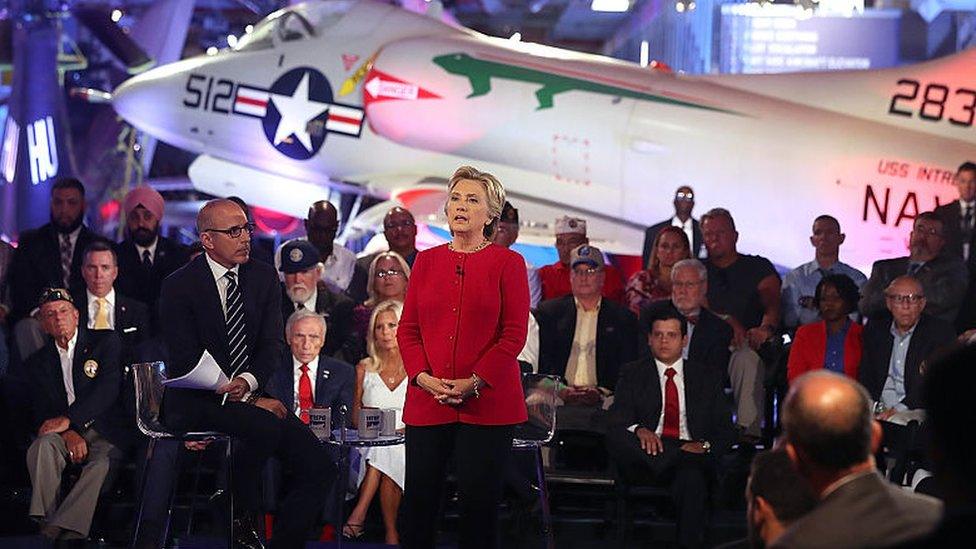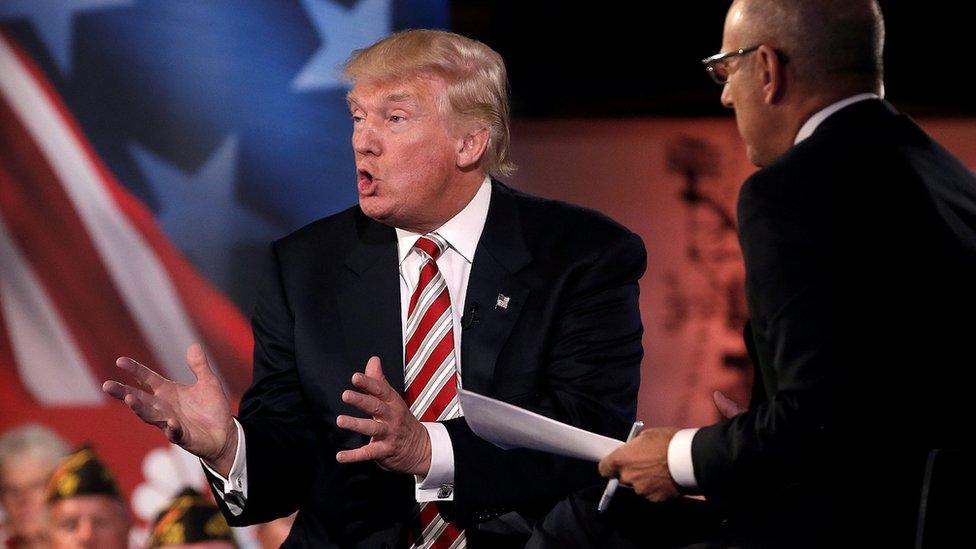US election: Six times Clinton or Trump messed up
- Published

If the so-called Commander-in Chief Forum in New York City was a dress rehearsal for the presidential debates that begin later this month, both candidates have their work cut out for them.
The 30 minutes allotted to each candidate made the proceedings feel like the political equivalent of speed-dating - and like speed-dating gone wrong, there was plenty of time for the participants to bury themselves with their words.
Mrs Clinton once again tripped up when discussing her use of a private email server as secretary of state. Mr Trump found new and interesting ways to show his tenuous command of policy details and shower questionable praise on a US rival.
Here are those and other moments each candidate may come to regret in the days ahead.

Hillary Clinton
The email server. She may have wanted to talk about why she is qualified to be US commander in chief, but she spent nearly a third of her time on the defensive about her emails.
She talked about classification "headers" and explained that there was "no evidence" her server had been hacked. She even said it may have been safer than those of the state department's, given that the government's (non-classified) system had indeed been breached.
When it came to handling classified information, she was unapologetic. "I did exactly what I should have done and I take it very seriously," she said. "Always have, always will."
For those keeping track at home, Mrs Clinton has gone from asserting that she never relayed classified information to that she never sent "marked" classified documents to that she never sent material with classified headers.
That's the rhetorical equivalent of rear-guard action that ends with your army pushed into the sea.

Iraq regrets. After the email muddle, NBC moderator Matt Lauer asked the Iraq War veterans in the audience how they felt about Mrs Clinton's expressing regret for supporting the war in which they served.
Mrs Clinton's response was to reiterate that she now thinks the war was a mistake, to talk about all the good things she's done for the military - the "totality of her record", as she put it - and to attack Mr Trump for lying about his past support for the war.
What Mrs Clinton didn't do was try to convince the military personnel in the audience that while she regrets the decision to send them into harm's way, she appreciates their sacrifice. It's the kind of empathetic flourish that made her husband, Bill Clinton, the master of the town hall debate.
Given that one of the the three presidential debates will have this same format, she'll need to raise her game - and fast.

Libyan casualties. Mrs Clinton stood by her decision, as secretary of state, to recommend military intervention in the Libyan civil war.
"I put together a coalition that included Nato, included the Arab League and we were able to save lives," she said. What she said next, however, could come back to haunt her.
"We did not lose a single American in that action."
Mrs Clinton was referring to the airstrikes the US launched against Libyan forces, but her political opponents - and the Trump campaign - likely will point to that line and cite the killing of US ambassador Christopher Stevens and three other Americans at the US consulate in Benghazi as evidence of her indifference to their deaths.
In fact, that's already started, external.


Donald Trump
Praising Putin. Mr Trump has taken fire for praising Russian President Vladimir Putin, asking Russian operatives to hack his opponent's email, hiring a campaign manager who worked for Russian-backed Ukrainian leaders and possibly having undisclosed ties to Russian financial interests. It would seem to be a questionable move, then, for the Republican nominee to double-down on praise for the Russian president during this high-profile forum. He sure did, however.
Mr Trump cited Mr Putin's 82% approval ratings, said he was a leader with "strong control" over his country and compared him favourably to President Barack Obama. He added that when Mr Putin called him brilliant, "I'll take the compliment, OK?"
"If he says great things about me, I'm going to say great things about him," Mr Trump continued.
That may be an excellent way to get along with colleagues and classmates, but Americans may not view it as the best foundation for US-Russian relations.

Trashing generals. When Mr Trump was asked if he stood by his claim that he knew more about defeating the so-called Islamic State than US generals," he said that under Mr Obama the generals had been "reduced to rubble".
A few minutes later came the killer follow-up. Why, in Mr Trump's national security speech earlier in the day, had he said as president he would give US generals 30 days to come up with a plan to defeat the so-called Islamic State.
Didn't Mr Trump say he was smarter than the generals? And didn't he say he already had a great plan?
Mr Trump's response boiled down to: 1) Yes, he did have a plan. 2) He also wanted to get advice from generals. 3) Maybe he would find "different generals", as the ones who support Mrs Clinton "have been losing for us for a long period of time". 4) Once he settled on a plan, or some combination of plans, he certainly wasn't going to tell Matt Lauer about it.
Like Mrs Clinton with her email answer, the longer Mr Trump talked the more he seemed to tie himself in knots.

Military rape. Mr Trump's worst moments in the forum - and in many of his Republican primary debates as well - came when he was pressed on his past remarks. After being asked about the high rate of sexual assaults in the military, Lauer brought up one of Mr Trump's more cringe-worthy tweets, from back in 2013.
"26,000 unreported sexual assaults in the military - only 238 convictions," he had written. "What did these geniuses expect when they put men and women together?"
Mr Trump insisted that his tweet was correct. He added that taking women out of the military wasn't feasible, but "something has to happen". He then talked vaguely about increasing prosecutions.
Current opinion polls show Mr Trump is facing record low support from female voters, and blaming sexual assaults on the decision to allow women in the military isn't going to help. This was the chance for Mr Trump to walk back his comments and offer some nuance. It was a glaring missed opportunity.
- Published7 September 2016
- Published26 August 2016
- Published1 September 2016